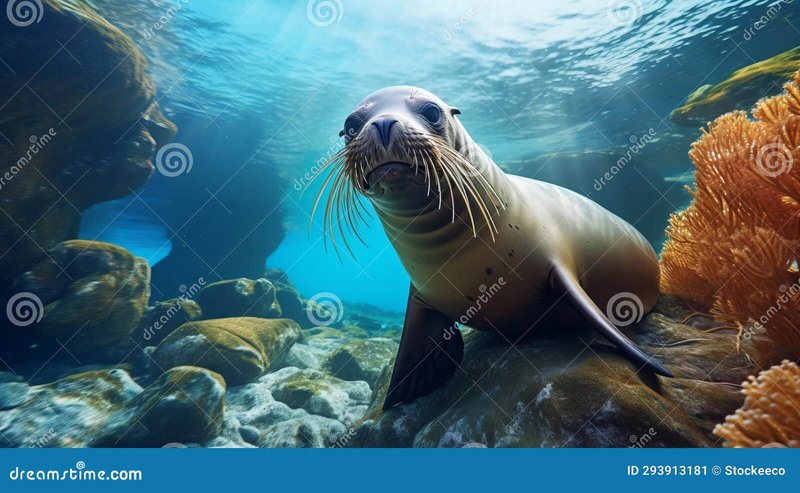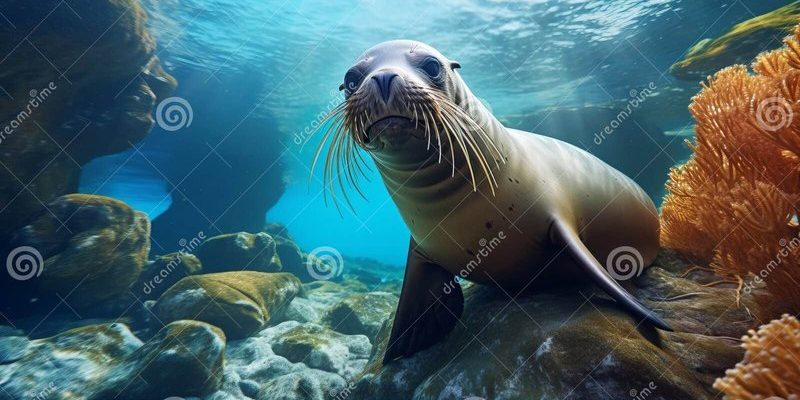
These marine mammals are not only entertaining to watch as they frolic on rocky shores, but they also help maintain balance in their habitats. From regulating fish populations to encouraging vibrant kelp forests, sea lions are true ecological powerhouses. Let’s dive deeper into their world and explore the different ways sea lions contribute to the marine ecosystem.
Understanding Sea Lions: A Quick Overview
Sea lions are part of the pinniped family, which also includes seals and walruses. They are found along the coasts of the Pacific Ocean, with species like the California sea lion being the most well-known. These animals are highly social and often gather in large colonies on beaches or rocky outcrops. Their external ear flaps and ability to “walk” on land set them apart from true seals.
You might wonder about their diet. Sea lions are opportunistic feeders, which means they eat a variety of prey. Fish, squid, and even small crustaceans make up their meals. This diverse diet helps keep fish populations in check, allowing other marine species to thrive.
Sea Lions as Apex Predators
One of the critical roles sea lions play in marine ecosystems is that of apex predators. By hunting various fish species, they help maintain the balance of the food web. Imagine a situation where sea lions aren’t around. Fish populations could explode, leading to overgrazing of smaller fish and invertebrates, disrupting the entire ecosystem.
When sea lions feast on certain fish, like sardines or anchovies, it allows other species to flourish. For example, if sea lions keep sardine numbers in check, it allows small schools of other fish to thrive. This balance is crucial for maintaining biodiversity in the ocean.
The Impact of Their Predation
Let’s consider some specific examples. In areas where sea lion populations have declined, researchers have noted a rise in certain fish species. While this might seem good at first, it can lead to overpopulation and depletion of other marine resources. So, in a way, sea lions act as guardians of the ocean, regulating prey populations.
Moreover, their hunting activities contribute to the nutrient cycling in the ocean. When sea lions consume fish and then excrete waste in the water, they release nutrients that other marine life relies on for growth. It’s an endless cycle where sea lions play a vital part in sustaining life in the ocean.
Kelp Forests and Sea Lions: A Mutually Beneficial Relationship
Kelp forests are vital marine ecosystems, providing habitat and food for a myriad of marine creatures. Sea lions love to hang out in these underwater jungles, hunting for food and resting among the kelp. The relationship between sea lions and kelp forests is fascinating and quite beneficial.
When sea lions feed on herbivorous fish, they help reduce the grazing pressure on kelp. If herbivores are left unchecked, they can decimate kelp forests, leading to habitat loss for many other marine species. So, in essence, sea lions help maintain the health and productivity of these underwater forests.
The Ripple Effect on Marine Biodiversity
As sea lions contribute to the health of kelp forests, they indirectly support a rich tapestry of marine life. Healthy kelp forests provide shelter for juvenile fish, which are crucial for sustaining fish populations in the area. They also serve as feeding grounds for sea otters and various species of fish, crustaceans, and other marine organisms.
By playing their part in this complex web of life, sea lions help ensure that marine ecosystems remain diverse and resilient. This biodiversity is essential for the ocean’s overall health and stability, much like how varied flora and fauna are necessary for a thriving forest.
Sea Lions and Climate Change
Climate change poses a significant threat to marine ecosystems, and sea lions are not exempt from its effects. Rising ocean temperatures can alter the availability of prey species, putting additional stress on these animals. Imagine trying to find your favorite food, only to discover it’s become scarce due to changes in the climate.
As sea lions struggle to find food, their populations may decline, leading to a cascade of effects throughout the ecosystem. When sea lion numbers drop, the balance shifts, potentially leading to overpopulation of certain fish species. This could disrupt the delicate balance that keeps marine ecosystems healthy.
The Importance of Conservation Efforts
To avert these issues, conservation efforts are essential. Protecting sea lion habitats, addressing overfishing, and mitigating climate change are crucial steps in ensuring that these animals can continue to thrive. When we invest in their protection, we also safeguard the health of the entire marine ecosystem.
Organizations and local communities are increasingly recognizing the importance of preserving coastal habitats and implementing necessary regulations to protect marine life. Remember, every action counts, and supporting conservation initiatives can have a positive impact on sea lions and their ecosystems.
The Cultural Significance of Sea Lions
Beyond their ecological role, sea lions hold cultural significance for many coastal communities. In some regions, they symbolize wildlife heritage and are featured in local art and traditions. Their playful nature captivates tourists and locals alike, making them a valued part of the coastal experience.
Many marine parks and aquariums also highlight sea lions in their education programs, fostering a deeper understanding of marine ecosystems. This awareness helps connect people to the ocean and emphasizes the importance of protecting these incredible animals and their habitats.
Getting Involved: How You Can Help
If you care about sea lions and their role in marine ecosystems, there are several ways you can get involved. Consider supporting local wildlife organizations or participating in beach clean-ups. Awareness is key, so sharing information about the importance of sea lions can help educate others.
You might also be interested in following local regulations designed to protect marine habitats. Whether it’s responsible fishing practices or observing wildlife from a distance, every little bit helps. Every action contributes to the health of our oceans, making a difference for sea lions and all marine life.
The sea lion’s role in marine ecosystems is more than just being a cute, whiskered animal we love to watch. They are vital to maintaining balance in their environments, supporting biodiversity, and providing cultural significance to coastal communities. As they navigate their underwater world, they remind us of the interconnectedness of life in the ocean.
By understanding their importance, we can appreciate these marine mammals even more. Let’s work together to protect their habitats and ensure that future generations can enjoy the beauty and vitality of sea lions in our oceans. After all, a healthy marine ecosystem benefits us all.

